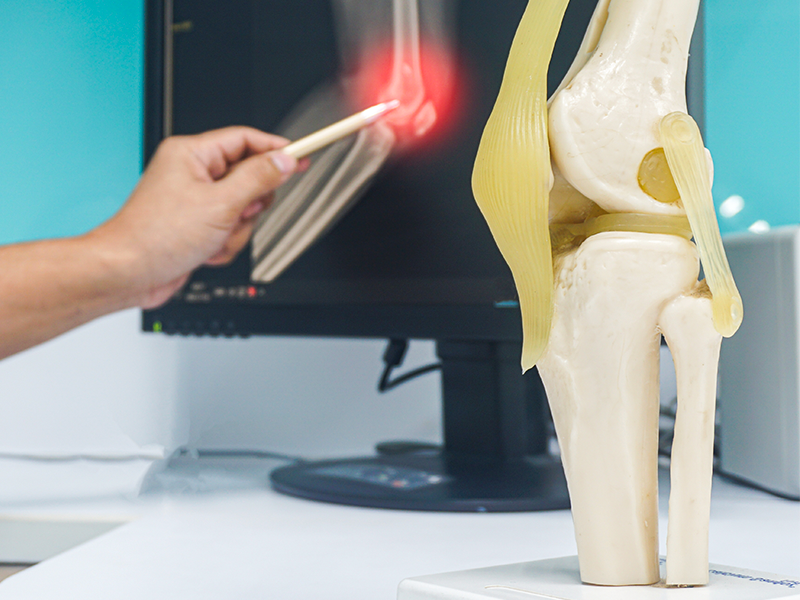Search
Find a Physician
Blog
Jun 1, 2023
Imagine a scenario where you’re constantly experiencing pain in your joints. You’ve tried visiting an orthopedist, and they’ve prescribed therapy and medication, but to no avail. Living with pain seems like your only option, which can drastically ruin your quality of life. Your only remaining choice is to visit an orthopedic surgeon.
This medical doctor specializes in treating bones, joints, tendons, ligaments, nerves, muscles, and sometimes soft tissue conditions through both conservative measures or surgery. For many people, surgery is the last option; however, it is also an option that can lead to a lasting solution.
Here are some answers to these questions and more.
The simplest definition is that orthopedic surgeons diagnose and treat musculoskeletal injuries and diseases. While they are surgeons, they also provide non-surgical treatments. Apart from this, they have an active part in prevention and rehabilitation.
Now, while most people fixate on bone fractures and injuries, orthopedic surgeons also tend to ligament tears, tendon injuries, and joint pain.
Now, not all orthopedic surgeons are the same. There are numerous specializations in this field to consider, as well. Each orthopedic surgery is complex in its own right. This is why the effects are best when specialists perform them.
Musculoskeletal injuries are too numerous to count. This is why complex procedures require a specialist approach. For instance, you have:
Aside from this, you also have general orthopedic surgeons who specialize in a wide range of conditions regarding bones, joints, tendons, ligaments, and muscles.
Each specialization takes at least several years of specialist training, so these doctors tend to be far more familiar than generalists and can provide superior orthopedic treatment.
Also, since advancements in orthopedic surgery are rapid, it takes a specialist to keep up with them.
The distinction is quite simple, although crucial.
Orthopedist is a doctor who specializes in diagnosing and treating musculoskeletal conditions using non-surgical methods. Their main area of expertise are minor fractures, back pain, sprains, and arthritis. Their main tools are medication and physical therapy.
So, what is an orthopedic surgeon? They are a doctor with training similar to that of orthopedists, only with additional training to provide surgical methods for their treatments.
Orthopedic surgeons work in hospitals, private practices, clinics, and rehabilitation centers.
Because orthopedic surgeons deal with sprains and fractures, most sports teams have their orthopedic surgeons on retainer. This is either a full-time club orthopedic surgeon or someone that they have an active collaboration with. We’ve already mentioned sports medicine as a potential specialization for orthopedic surgeons.
Pediatric orthopedic surgeons may work at children’s clinics.
Finally, an orthopedic surgeon may work at an educational institution.
Overall, it all comes down to specialization.
The road to becoming an orthopedic surgeon is not an easy one. First of all, you need a bachelor’s degree from college or univeristy. Most major in re-medicine, biology, or related science but any major is acceptable..
Then you need to pass the MCAT (Medical College Admission Test) and get accepted to medical school. Graduation is usually after four years.
Once you’re done, you need to complete a five-year residency program in orthopedic surgery. Which is one of the most highly competitive residency programs.
When all of this is done, you need a medical license.
Now, past this point, you’re an orthopedic surgeon, but your work is far from done. Most people then pursue a one or two-year fellowship in a subspecialized field within orthopedic surgery (totaly joints, hand surgery, etc…). Then most choose to become board certified. This entails standardized tests as well as an evaluation of your clinical practice and results. Once board certification is granted, the surgeon then needs maintain certification with CME credits, continuing medical education.
Understanding when to see an orthopedic doctor is pretty straightforward. If you’re suffering pain in your:
In these scenarios, it’s a job for an orthopedic doctor.
Now, the best action here would be to look for an orthopedic doctor at a specialized orthopedic clinic. This way, you get the optimal medical care.
The treatment always depends on the injury, but examining some commonly used orthopedic methods might help us understand this profession and specialization a lot better.
The most common non-surgical treatment methods are rest, physical therapy, medication, and the use of orthopedic devices. Braces and casts are the most common and recognizable such devices.
Minor injuries like strains and sprains are always treated non-surgically, as are conditions like arthritis.
Steroid injections are also often utilized as they calm inflammation which is the source of many problems.
Surgery may be the only option if non-surgical options don’t give the desired effect. This is usually true in scenarios with trauma, limited mobility, or severe joint pain.
Surgery is sometimes used in scenarios with degenerative conditions (like osteoarthritis or degenerative disc disease) and with some congenital conditions.
While non-surgical treatments for orthopedic problems seem safer, sometimes surgery is a better choice. Most of these surgeries are quite safe and have staggering success and recovery rates. Remember that you should never decide before consulting an orthopedic surgeon first.
So, what is an orthopedic surgeon? It’s a medical specialist trained in the surgical and non-sugical treatments of musculoskeletal conditions. There are many specialties, and it’s always best to find a specialist in a body part you’re struggling with.
Just remember that, while safe, surgery is usually not a first choice. Try some medical treatments first, but if all else fails, try to find the best orthopedic clinic and schedule your surgery. Learning more about the subject matter always helps, so even if you just get a quote, you’ll be far better off.
Request an appointment today with one of OINJ’s orthopedic surgeons. Our call center can help guide you to the most appropriate specialist.
This article was reviewed and approved by an orthopedic surgeon as we place a high premium on accuracy for our patients and potential patients.